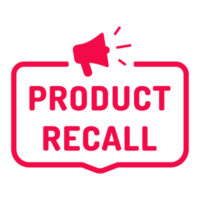Product Recalls and Liability

Every year, thousands of products, from drugs to food to other consumer items, are recalled by companies after they have caused injury or death to one or more consumers. Some are recalled before they cause damage, but for the majority, it is too late to prevent harm. However, the mere existence of a product recall does not trigger liability unless you seek it out. If you or your child has been injured by a defective product, you should contact an experienced attorney to explore what options you may have to hold them liable.
You Must Start The Process
A report from SafeKids Worldwide illustrates an average number of recalls that may occur every month; in cases like these, the company may offer remedies to consumers that were injured, but this is done on a strictly voluntary basis. One might assume that a product being under recall might imply some kind of legal liability – after all, a recall is made only when evidence exists that a product is potentially dangerous – but at least in Florida, the mere fact of a recall does not establish any kind of presumption.
If you are injured by a product that is under recall, it is incumbent on you to file suit to try and recover damages for what you have been through. If your minor child has been injured, you can generally file suit on their behalf, using a legal concept called ‘next friend,’ though the nature of the damages they can recover might slightly differ. Depending on the product, the injuries sustained can be extensive – anything from cuts and scratches up to traumatic brain injury (TBI) and drug interactions – and it is worth your time to file suit.
Product Liability in Florida
While Florida product liability lawsuits can be complex, there are only three different varieties, at their most basic core: (1) design defect cases, where the argument is that the product in question was defective and dangerous from the beginning; (2) manufacturing defect cases, where one tries to argue that a problem in the manufacturing process caused the defect; and (3) marketing defect cases, also called “failure to warn” cases, where the product was dangerous as designed, but there was no warning to consumers about its potential hazards.
If you can establish that one of these fact patterns is true in your case, you must then show that you or your child actually suffered injury due to the product. While the recall does not immediately establish liability, Florida law does sometimes allow an injured plaintiff to use the concept of strict liability. If you can show that the product had a defect that led to an “unreasonably dangerous” condition, and that your injuries were directly because of this, strict liability is established, which means that you would not have to go through the process of establishing negligence in court.
Call A Tampa Product Liability Attorney
In this day and age, sometimes product recalls may escape one’s notice, especially given the life changes happening due to the COVID-19 pandemic. If you or one of your loved ones has been injured by a product under recall, it is up to you to get the process of seeking compensation in motion. The Tampa personal injury attorneys at the Rinaldo Law Group have years of experience in these types of cases, and are ready and willing to try and help you with yours. Call our offices today for a free consultation.
Resource:
safekids.salsalabs.org/recalls_may2020_copy1_copy1_copy1_copy1_copy1_copy1_copy1?wvpId=95dc650c-a40a-4c21-8c09-8eac9089f6ba
